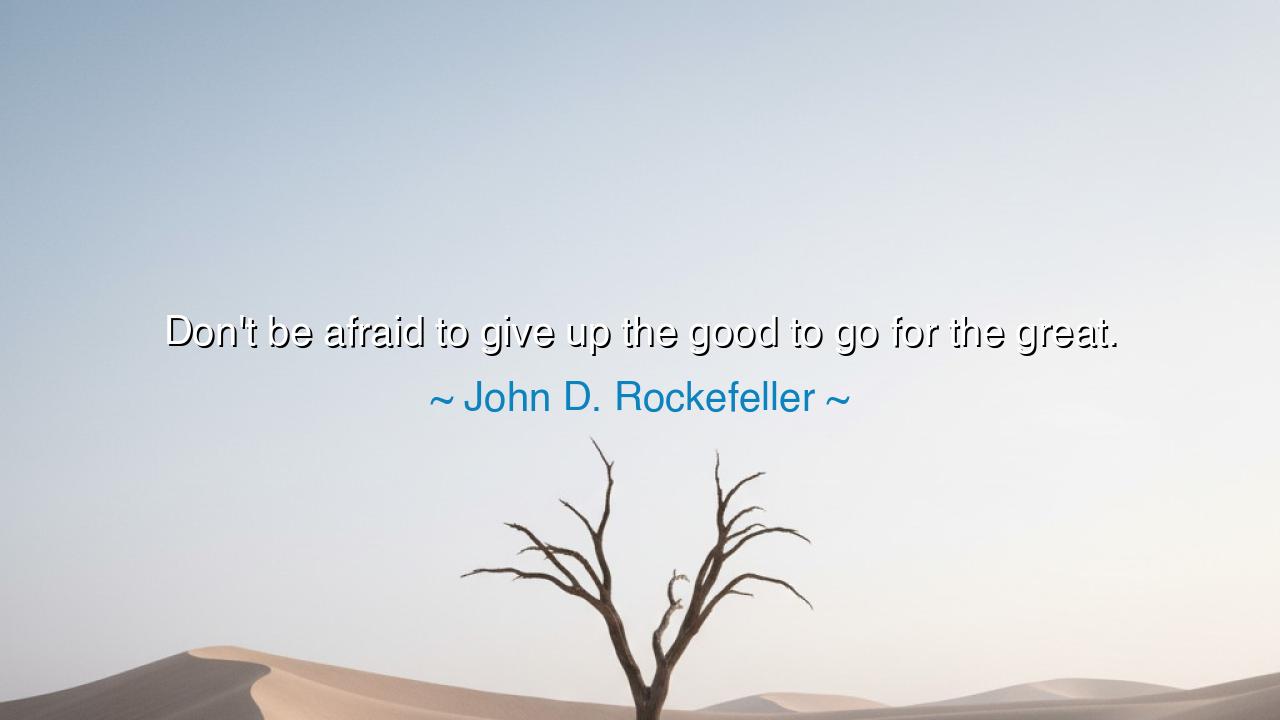
Don't be afraid to give up the good to go for the great.






Hearken, children of the ages yet to come, and attend to the enduring wisdom of John D. Rockefeller, who proclaimed: “Don't be afraid to give up the good to go for the great.” Within these words lies a profound meditation on courage, ambition, and the pursuit of excellence, teaching that one must sometimes forsake comfort, security, or the familiar in order to grasp what is truly extraordinary. The ancients knew well that fortune favors the bold, and that greatness is seldom attained without sacrifice.
To cling to the good is natural, for the familiar is a shield against uncertainty. Yet Rockefeller reminds us that progress demands courage, the willingness to step beyond what is safe to pursue what is magnificent. The philosopher Seneca wrote of the wise man who seeks virtue over pleasure, daring to leave the ordinary behind. Similarly, to reach greatness in any field—be it art, science, or leadership—one must forsake lesser achievements and strive for the extraordinary, embracing risk as a necessary companion to aspiration.
Consider the life of Christopher Columbus, who left the shores of Europe to sail into the uncharted Atlantic. He abandoned the known, the comfortable paths of his time, for the vision of lands unseen. To many, he risked all for what seemed impossible, yet in his daring lay the seed of discovery. Rockefeller’s counsel mirrors this ancient truth: the abandonment of the good in pursuit of the great is not recklessness, but a disciplined choice to follow vision and ambition.
Even the arts teach this lesson. Michelangelo, laboring on his sculptures and the Sistine Chapel, could have contented himself with ordinary commissions, but he pursued excellence that would endure through the ages. The choice to forsake the “good enough” for the possibility of greatness required pain, patience, and unrelenting focus. In these lives, we see Rockefeller’s teaching realized: sacrifice and daring are the companions of extraordinary achievement.
The principle also echoes in moral and civic realms. Leaders who aim only for mediocrity maintain stability, but those who strive for justice, reform, and vision risk disapproval, uncertainty, and resistance. Yet it is in such daring that societies evolve. The ancients revered those who reached beyond the mundane, understanding that human potential is fulfilled not in comfort but in striving for the heights.
From this reflection, a lesson emerges: greatness is often veiled behind the relinquishment of lesser comforts. One must have courage to release security, to forsake the ordinary, and to follow the call of ambition. Rockefeller’s insight teaches that fear of loss must never constrain aspiration, for to reach what is truly remarkable, one must act decisively and embrace the unknown with determination.
Practical guidance flows naturally: evaluate your pursuits and recognize when the good has become a chain. Dare to aim higher, invest effort where impact is greatest, and let vision guide your sacrifices. Surround yourself with those who inspire excellence, and cultivate patience and resilience, for the path from good to great is seldom easy but always transformative.
Children of the ages, let this teaching anchor your hearts: do not be satisfied with mediocrity, nor blinded by the comfort of what is safe. Seek the heights, embrace the unknown, and relinquish what is merely adequate for the pursuit of the extraordinary. For as Rockefeller counsels, true fulfillment, legacy, and greatness lie beyond the good, awaiting those who dare to claim it with courage, discipline, and unwavering vision.
If you wish, I can also craft a more narrative, heroic version, evoking imagery of ancient explorers, artists, and leaders, making Rockefeller’s lesson feel like an epic oral teaching for audio narration. Do you want me to do that?






AAdministratorAdministrator
Welcome, honored guests. Please leave a comment, we will respond soon